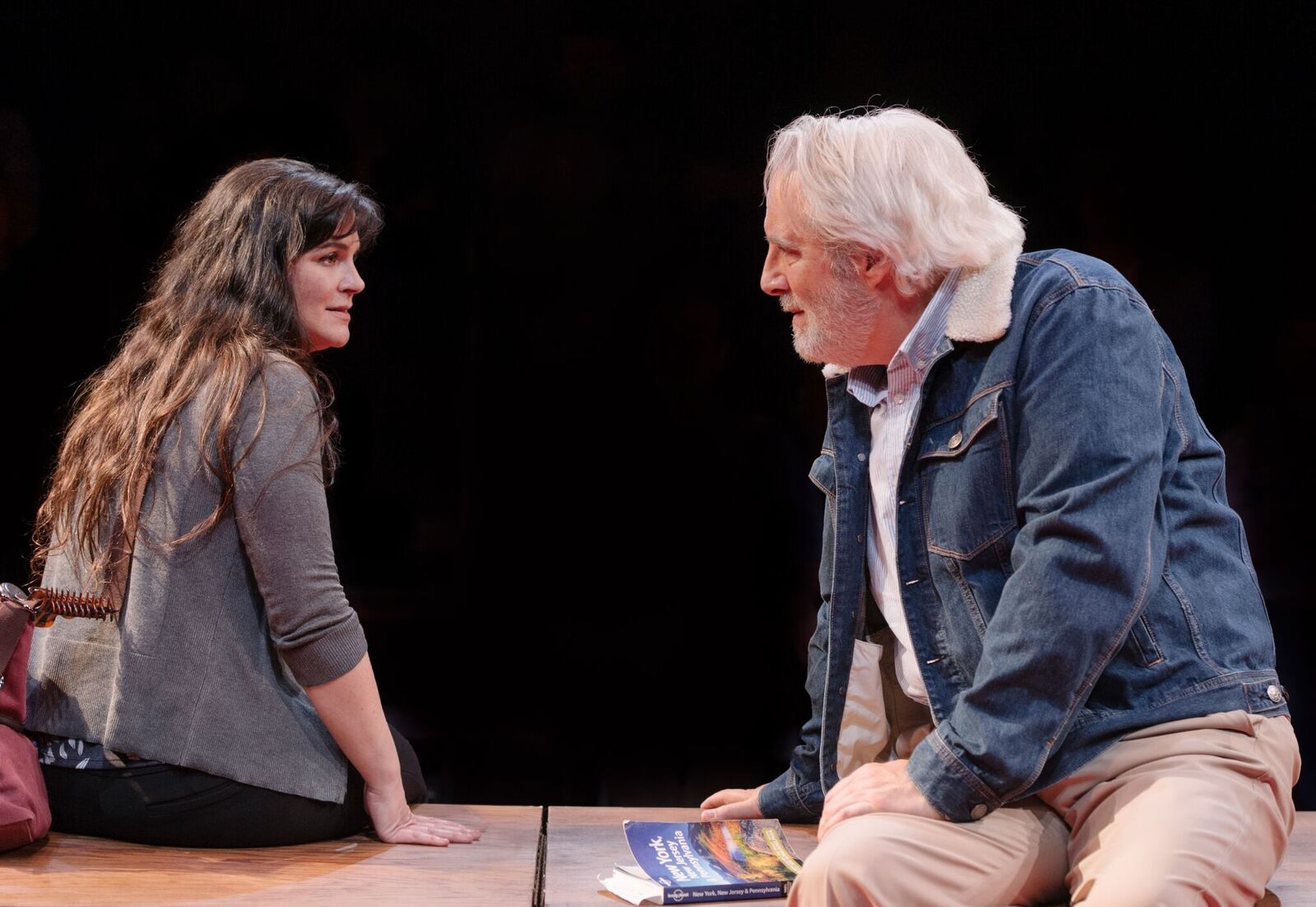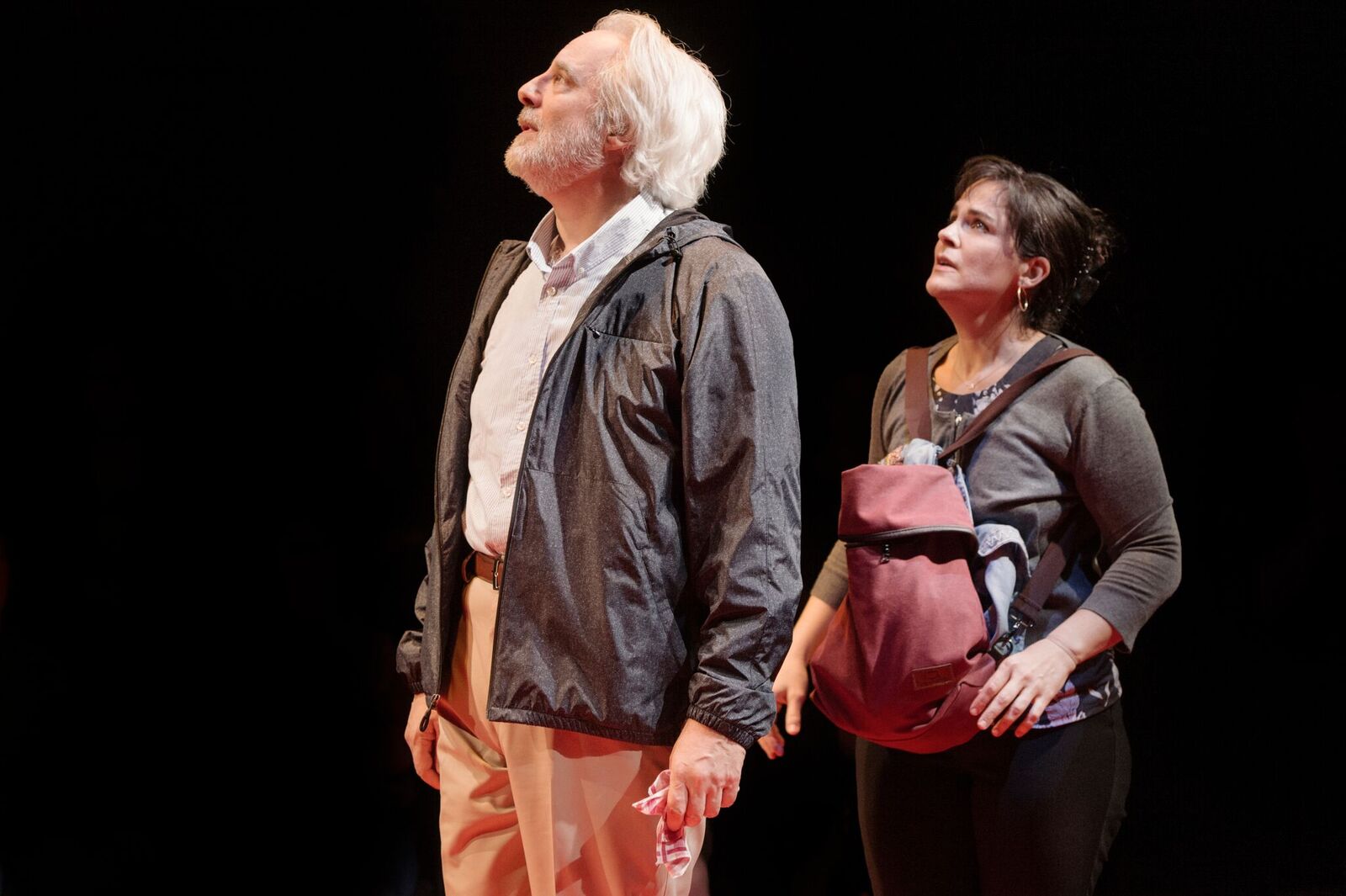Simon Stephens’ Heisenberg, now playing at Signature Theatre, begins with two souls in hiding. Georgie Burns (Rachel Zampelli) hides whatever pains and losses she has suffered behind her frenetic energy: torrents of unfiltered, often profane words, and ever-changing, made up (or not?) stories. Alex Priest (Michael Russotto) hides his pain behind reticence and routine.

Georgie provides a shifting, often fictional, occupational history. Alex has run the same, now seldom patronized, butcher shop throughout his adult life. She is American, with a flat nasal accent. He is Irish, with a rich, warm accent undimmed by decades in London. She’s in her mid-40s. He is 75.
She startles him, a stranger on a train platform bench, with a kiss on the neck. An unbridled pursuit ensues. Notwithstanding his attempts at quietly, politely backing away, Alex is a movable object responding to an irresistible force. In the process, some unveiling begins. His long sorrow over the loss of a sister when both were children and a fiancée when he was a young man; her estrangement from a (real?) young adult son; their growing realization of erotic attraction.
There is comedy aplenty in Heisenberg, a host of funny lines and situations, delivered by the actors with expert timing. There is romance, not simply attraction and sexual interest but a gradual opening of each character’s self to the other. Alex, who in the show’s opening is shown in a series of light and sound snapshots of a lonely man tossing in his bed, is moved to give Georgie a lengthy, quite amusing, list of his preferences in music.
She expresses a wish to be able to dance with him. He discloses his tendency to cry and displays his anger when she violates his privacy. She becomes willing to admit her deceptions and mixed motives and to ask for more than she thinks he is prepared to give. They become able to express a mutual need just to be, together. While Heisenberg is a love story of a sort, Stephens’ characters and their journeys are realized far beyond the conventions of the “romantic comedy” genre.
In one of the most-quoted lines from the play, Alex talks of music as existing in the space between the notes. One of the earmarks of Joe Calarco’s sensitive direction of the show is the use of silences – notwithstanding Georgie’s verbal blizzards – to help tell the characters’ stories. There is a lovely moment, for example, when Alex, briefly alone on stage, wordlessly cradles a pillow and breathes in Georgie’s scent.
The portrayals by Zampelli and Russato are full of specificity, detail, and nuance. This is an “actors’ play,” but the full humanity given the characters in this performance shows it to be much more than an acting school exercise. Zampelli and Russotto shine without being showy.

The show for which Stephens is best known, The Curious Incident of the Dog in the Night-Time, is a bravura technical theater piece, with spectacular, breathtaking lighting and sound designs. The stagecraft pleasures of Heisenberg are quieter and simpler. While its sound (Kenny Neal) and light (Andrew Cassina) designs are effectively and precisely coordinated, the physical centerpiece of Signature’s production is a pair of tables with folding panels that are the only large objects on Pamela Weiner’s set.
The panels can be a bed, a pair of benches, a bar and bar seat, etc. The actors move them into their various configurations. In doing so, they are not acting merely as stagehands. Panels can be slammed in anger. As the characters move set pieces to create a bed, their rearranging and covering the units has the character of delighted, giggly foreplay.
As Calarco explains in his program note, the title of the show refers to the great innovator of quantum mechanics in the first half of the 20th century, Werner Heisenberg, who famously proposed the “uncertainty principle,” the notion that at the subatomic level, one cannot simultaneously measure accurately the position and velocity of a particle.
Since Michael Frayn’s deep and extensive exploration of the subject in his brilliant Copenhagen, this idea has become a popular analogy to the uncertainties and randomness of human existence. It’s a nice conceptual conceit for Heisenberg, less important though it may be than the lived reality of the characters presented so well by the script and actors.
Running Time: 90 minutes, with no intermission.
Heisenberg plays through November 11, 2018, at Signature Theatre – 4200 Campbell Avenue, in Arlington VA. For tickets, call 703-820-9771, or purchase them online.




